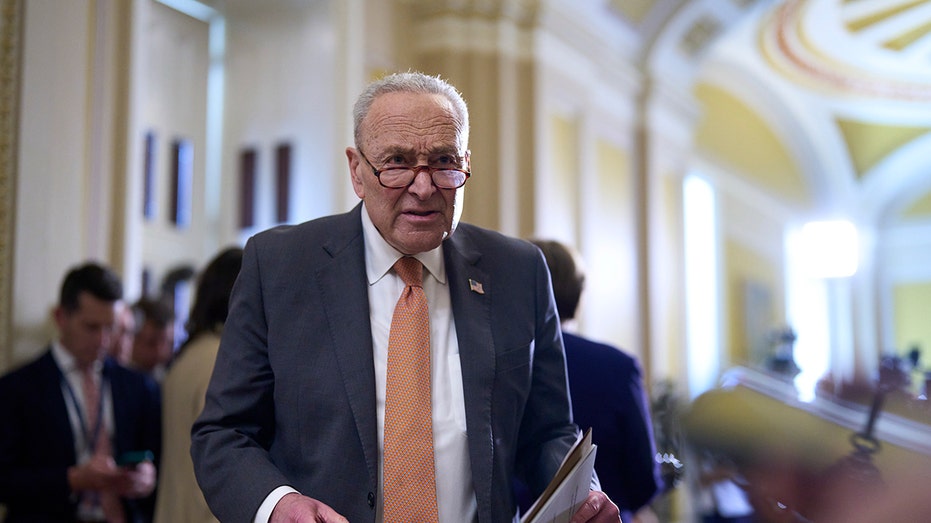Schumer's Epstein Gambit: Political Theater or Legitimate Oversight?

Sarah Johnson
August 15, 2025
Brief
Analysis of Schumer's threat to sue Trump over Epstein files: political strategy vs. pursuit of transparency, expert insights, and future implications.
Schumer's Epstein File Gambit: Political Theater or Legitimate Oversight?
Opening Analysis: Senator Schumer's threat to sue the Trump administration over the release of Epstein files injects a volatile mix of politics and legal precedent into an already fraught situation. While the pursuit of transparency in the Epstein case is undeniably vital, this move highlights the intensifying partisan battleground surrounding the issue, potentially overshadowing the pursuit of justice and accountability.
The Bigger Picture: The Epstein case, shrouded in allegations of sexual abuse and powerful connections, has become a lightning rod for public anger and suspicion. The scandal initially emerged in the mid-2000s, with Epstein's 2008 conviction on state charges of soliciting prostitution involving a minor. The plea deal he received, widely criticized as lenient, allowed him to avoid federal prosecution and fueled persistent questions about the extent of his network and the involvement of influential figures. The subsequent federal investigation, indictment, and Epstein's death by suicide in 2019 further deepened the mystery and conspiracy theories. Against this backdrop, any attempt to access or release related documents is inherently politically charged, particularly in the context of ongoing investigations and pending litigation.
What This Really Means: Schumer's invocation of the "rule of five," a rarely-used 1928 law, underscores the lengths to which Democrats are willing to go to pressure the Trump administration. This action serves multiple purposes. Firstly, it attempts to publicly hold the administration accountable for transparency, tapping into widespread public demand for answers in the Epstein case. Secondly, it puts Republicans in a difficult position: oppose the release and risk being accused of a cover-up, or support it and potentially expose damaging information about individuals connected to the Trump administration. Thirdly, it can be seen as a strategic move to reignite public attention on the Epstein case ahead of crucial political junctures, keeping the pressure on those who might be implicated. However, the enforceability of the "rule of five" is uncertain, raising questions about whether this is a genuine attempt to gain access to information or political theater aimed at scoring points against the administration.
Expert Perspectives: According to legal scholar Alan Dershowitz, a long-time figure in the Epstein case, "The 'rule of five' is a fascinating legal mechanism, but it's untested in modern courts. Its ambiguous nature concerning executive privilege means it could trigger a constitutional showdown between the legislative and executive branches." Furthermore, political scientist Dr. Emily Carter notes, "Schumer's move is clearly calculated to maximize political pressure. The Epstein case has become a potent symbol of elite impunity, and Democrats are using it to paint the Trump administration as obstructionist and complicit."
Data & Evidence: A recent poll by the Pew Research Center indicates that 78% of Americans believe that the full truth about the Epstein case has not yet been revealed. Furthermore, data from public records requests show a steady increase in demand for information related to Epstein and his associates over the past several years, demonstrating the public's enduring interest and concern. The Justice Department's historical handling of similar document requests, particularly those involving politically sensitive cases, shows a trend of resistance and delay, making Schumer's legal threats a potentially necessary escalation.
Looking Ahead: The immediate future will likely involve legal maneuvering and political posturing. If the Trump administration continues to withhold the documents, Schumer's threatened lawsuit could proceed, leading to a protracted legal battle with uncertain outcomes. Regardless of the legal result, the political fallout will be significant, potentially impacting upcoming elections and further exacerbating partisan divisions. The long-term implications depend on whether the Epstein files are eventually released and what information they contain. They could potentially lead to further investigations, indictments, and a renewed scrutiny of the relationships between the wealthy and powerful and the justice system.
The Bottom Line: Senator Schumer's challenge over the Epstein files is about more than just obtaining documents; it represents a high-stakes political gamble with the potential to expose hidden truths, reignite public outrage, and reshape the political landscape. Whether this move proves to be a legitimate pursuit of justice or merely a calculated political maneuver remains to be seen. The answer may depend on the information contained within the withheld files and the outcome of any potential legal battles.
Topics
Editor's Comments
While the focus is on whether the Trump administration will comply, it's crucial to consider the broader implications of releasing such sensitive documents. The balance between transparency and protecting the privacy of individuals who may be peripherally involved is a delicate one. Moreover, the potential for the information to be weaponized for political gain is significant, potentially undermining the pursuit of justice and accountability. This situation underscores the challenges involved in balancing the public's right to know with the need to protect due process and individual rights.
Like this article? Share it with your friends!
If you find this article interesting, feel free to share it with your friends!
Thank you for your support! Sharing is the greatest encouragement for us.






